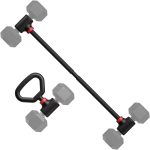A pre-workout supplement typically contains around 300mg of caffeine, which is considered to be the optimal dose for providing energy without causing a crash. However, the exact amount of caffeine can vary depending on the brand and formulation.
Research suggests that the ideal dose of caffeine for improving exercise performance is 3-6mg per kg of body weight. For example, an 80kg individual would need approximately 240-480mg of caffeine. It’s important to note that caffeine sensitivity can vary among individuals, so it’s best to start with a lower dose and adjust accordingly based on personal tolerance.

Credit: www.stack3d.com
Understanding Pre Workout Supplements
Pre workout supplements are formulated to provide an energy boost and enhance athletic performance. Many people use them to increase energy, focus, and endurance during their workouts. These supplements often contain ingredients such as caffeine, creatine and beta-alanine. Which are known to improve performance.
However, it’s important to note that not all pre-workout supplements are safe for everyone. Some individuals may experience negative side effects or have underlying health conditions that could be worsened by these supplements. It’s always best to consult with a healthcare professional before incorporating any new supplements into your routine.
Additionally, it’s important to follow the recommended dosage guidelines and not exceed the recommended amount of caffeine intake. Be mindful of your body’s response to pre workout supplements and adjust accordingly to ensure your safety and well-being.
The Role Of Caffeine In Pre Workout
Caffeine plays a crucial role in pre-workout supplements due to its numerous benefits. It stimulates the central nervous system, increasing alertness and reducing fatigue. Additionally, caffeine boosts endurance, allowing you to push through intense workouts. It also enhances focus, concentration, and reaction time.
Caffeine works by blocking adenosine receptors in the brain, which reduces drowsiness and promotes wakefulness. The appropriate dosage of caffeine in pre-workouts varies, but the recommended range is usually between 150-300mg. It’s important to note that individual tolerance levels may differ, and it’s advisable to start with a lower dose if you’re sensitive to caffeine.
Overall, caffeine is a valuable ingredient in pre-workout supplements, offering an energy boost and improved performance during workouts.
Popular Pre Workout Brands And Their Caffeine Content
Popular pre workout brands vary in their caffeine content. Let’s analyze a few of them. Brand 1 offers a moderate dose of caffeine, providing a kick of energy without overwhelming. Brand 2, on the other hand, has a higher caffeine level, which may suit those who need an extra boost.
Lastly, Brand 3 contains a lower amount of caffeine, making it suitable for individuals who are sensitive to stimulants. It’s important to note that the optimal caffeine dosage in pre workout supplements is around 300mg. This amount typically provides enough energy without causing any crash or adverse effects.
When selecting a pre workout, consider your caffeine tolerance and choose a brand accordingly.
Factors Affecting The Caffeine Content In Pre Workout
The caffeine content in pre workout supplements can vary due to several factors. One of the main influences is the manufacturing process, which can determine how much caffeine is added or retained during production. Additionally, ingredient sourcing plays a role in the caffeine content, as different sources may have varying levels of caffeine.
The product formulation also affects the caffeine content, with some pre workouts being formulated to contain higher levels of caffeine than others. Overall, it’s important to consider these factors when choosing a pre workout supplement, as the caffeine content can significantly impact its effectiveness and potential side effects.
Tips For Choosing The Right Pre Workout Based On Caffeine Content
Understanding your caffeine tolerance is essential when choosing the right pre-workout based on caffeine content. Properly assessing the caffeine content on product labels is crucial to avoid consuming too much or too little caffeine. You should also consider other ingredients in the pre-workout formula and how they synergize with caffeine.
Some ingredients may enhance the effects of caffeine, while others may mitigate its impact. Finding the right balance of caffeine and other ingredients can help optimize your energy levels and enhance your workout performance. Remember that caffeine affects individuals differently, so what works for one person may not work for another.
It’s important to start with a lower caffeine dosage and gradually increase as needed, while closely monitoring its effects on your body.
Potential Side Effects And Risks Of High Caffeine Pre Workouts
Excessive caffeine intake can lead to common side effects such as jitters, insomnia, and increased heart rate. These effects can be heightened if consumed in high amounts, and long-term excessive caffeine intake may result in dependency and tolerance. Additionally, there are associated risks, including digestive issues, dehydration, and potential interactions with medications.
It is important to practice responsible caffeine consumption and moderation to prevent these side effects and risks. This includes being aware of the caffeine content in pre-workout supplements and considering personal tolerance levels. While the optimal dose of caffeine in a pre-workout may vary for individuals, it is generally recommended to keep it around 300mg to provide sufficient energy without causing a crash.
By being mindful of caffeine intake, individuals can enjoy the benefits of pre-workout supplements without experiencing adverse effects.
Alternatives To High Caffeine Pre Workouts
400mg of caffeine in a pre-workout might be too much for some individuals. It’s recommended to stick to an optimal dose of 300mg to avoid any negative effects. Increasing caffeine dosage can be done if needed, but reducing it is not possible.
Therefore, it’s better to start with lower caffeine pre-workout options. There are various alternatives available, such as low caffeine or caffeine-free pre-workouts, natural and organic pre-workout alternatives, and supplements with energy-boosting ingredients. These options can provide you with the necessary energy for your workout without the crash or jitters associated with high caffeine content.
It’s important to find the right balance that works for your body and helps you achieve your fitness goals without any adverse effects.
Frequently Asked Questions
Is 400 Mg Of Caffeine Too Much In A Pre-Workout?
400 mg of caffeine in a pre-workout may be too much for some individuals. The optimal dose is generally considered to be around 300 mg to provide ample energy without causing a crash.
How Much Caffeine Should Be In A Pre-Workout?
The optimal dose of caffeine in a pre-workout is 3-6mg per kg of body weight, or around 240-480mg for an 80kg individual.
Is 350 Mg A Lot Of Caffeine For Pre-Workout?
350 mg of caffeine is considered a high amount for pre-workout and may be too much for some individuals. It is recommended to consume 3-6 mg of caffeine per kg of body weight for optimal exercise performance.
Is 600 Mg Of Caffeine Too Much In Pre-Workout?
600 mg of caffeine in pre-workout may be too much for some individuals. The optimal dose of caffeine for improving exercise performance is 3-6 mg per kg of body weight. This would typically be around 240-480 mg for an 80 kg person.
Conclusion
For those wondering how much caffeine should be in a pre-workout, research suggests that the optimal dose for improving exercise performance is around 3-6mg per kg of body weight. This means that for an 80kg individual, the recommended caffeine dosage would be approximately 240-480mg.
It’s important to note that while some individuals might respond well to higher doses of caffeine, others may experience negative effects such as jitters or crashes. Therefore, it’s crucial to find the right balance that works for your body. Additionally, it’s worth mentioning that caffeine can be added to a pre-workout if needed, but it can’t be removed once it’s already included.
Ultimately, 300mg is considered an optimal dose, providing plenty of energy without the risk of crashing. So, be mindful of your caffeine intake and find the right amount that best suits your individual needs.





